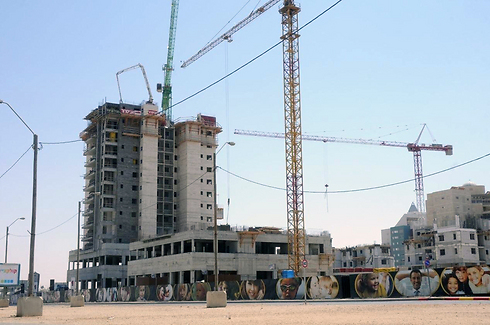
Ohad and Ilana received a housing grant over a decade ago in order to buy their home.
More than a decade ago, young couples living in southern Israel were able to buy a home – many with financial aid from the state provided to young families willing to set roots in the Negev. Today, young couples cannot afford to become homeowners amid rising housing prices and stagnant wages, and the government is no longer providing assistance.

One couple who bought an apartment in southern Israel when the government still provided aid, examined the market today and said, "If we wanted to buy a home today, there is no way we would've succeeded. No way in the world."

A housing development in Be'er Sheva which man say only the weathy can afford. (Photo: Herzel Yosef)
The Negev Laws, passed in 2000, provided tax reliefs to residents of Be'er Sheva and its surroundings, an additional grant to buy an apartment for young couples and more. Today, these laws are no more than a distant memory, and tax benefits have been reduced drastically – existing only in remote communities such as Mitzpe Ramon and Dimona.
"If young couples received help now like they did then, the situation in Israel would be completely different," says Oren Joreno, a resident of Be'er Sheva.
Joreno and his wife Nurit, both 41 years old, are parents to two children aged 12 and 14, and bought a house 14 years ago which was subsidized by the Negev Law and the Sharansky Law, which also gave grants to those who met the criteria for the purchase of a new apartment.
"We were a young 24-year-old couple and now we are about to finish paying our mortgage. The conditions for eligibility were determined by how many siblings you had, your military service, and more," says Nurit. "We were helped a lot with housing and rent. The state used to help."
Nurit has been a state employee for 16 years now and her husband works as an electrician at the Electra company. Together, they earn NIS 13,000 a month after taxes and they know that today they would have no chance of buying another home.
"Today, it's a disgrace," says Oren. "Every day when we come home we thank God that this is our kingdom. But for young couples it's really hard, the rent is continuously rising, and today people are paying very expensive mortgages. Whoever has a home today is rich."
"I look at my husband's nieces and nephews, the next generation, and they have a hard time surviving and borrow money from us even though both of them work," says Nurit. "In our time there really was help. We saw it. The monthly payments were lower than what they are today: We pay back NIS 1,400 but today people return NIS 3,000-4,000. These are astronomical figures."
Nurit is calling for a change and her husband agrees. "We have a prime minister that is an economist, but the doors are blocked and they must be opened. He can open the option of grants for young couples and let them live, but we are simply denied this. Everybody could be a homeowner," says Oren.
Hagit, 36, and Ali Elimelech, 41, live in Be'er Sheva in a home they purchased 11 years ago in the prestigious Ramot neighborhood. They also received a subsidy within the Negev Law framework.
"They gave out NIS 20,000 in equity back then, there wasn't a need for too much," explained Hagit. "Those who didn't do this a decade or more ago, there is no chance they would be able to buy a home today without help from their parents. The government is doing nothing to help. And it's not just with housing - it's also with the cost of living. Everything is going up except for wages – which are stagnant. We feel like we are being backed into the corner."
"If the state wanted to develop housing beyond the limits of central Israel, it could do it," says Ilana, 35, who lives in the Eshkol Regional Council with her husband Ohad, 39, and her two children aged 8 and 2 and a half. In 1999, Ohad bought a share of land with financial assistance provided from the Negev Law. They received assistance totaling 10 percent of the property value.
"The choice to live in this area enabled us to acquire the property. Today, even those who buy (homes) in the south are only those that have financial ability," says Ilana.
"The only time when the residents of the Negev felt as though they were an inseparable part of the State of Israel was the period when we passed the Negev Law," says former MK Weizman Shiry, who was one of the law's main proponents.
"There were tax benefits and an additional grant for housing purchases in Be'er Sheva and the surrounding area. It was a great period for contractors and especially for local residents," says Shiry.
According to Shiry, "The person who cancelled the Negev Laws and cancelled all the grants associated to housing was finance minister Benjamin Netanyahu. During my time, we cancelled all the benefits for Judea and Samaria and transferred the funding to the Negev. But now we have a housing minister who only cares about settlers. We closed all the roads during the struggle over the Negev Laws but nothing helped. They changed their priorities and cancelled the benefits."















